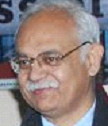The list given below is only indicative.
• Relevant research publications and documents from different departments and agencies relating to maintenance of infrastructure such as roads, bridges, airports, etc.
• A, Amekudzi, and S. McNeil, Infrastructure Reporting and Asset Management: Best Practices and Opportunities, American Society of Civil Engineers, 2008.
• D. Coffelt, and C. Hendrickson, Fundamentals of Infrastructure Management, 2017, Pittsburgh, USA.
• Mohammed M Ettouney and S. Alampalli, Infrastructure health in civil engineering – Theory and components, 1st ed, CRC press, 2012.
• W. Huddin W.R. Hudson, and R. Hass, Public Infrastructure Asset Management, 2nd Ed, McGraw Hill Education, 2013.
• Standards such as Japan Society of Civil Engineers publications and specifications (especially those dealing with concrete materials and construction, and maintenance strategies). For example, JSCE subcommittee, Standard specifications for concrete structures –2007 “Maintenance”, Report: JSCE guidelines for concrete (No. 17), Japan Society of Civil Engineers, Tokyo, Japan, 2010
• Relevant documents published by the BIS, IRC, etc


DOWNLOAD APP
FOLLOW US